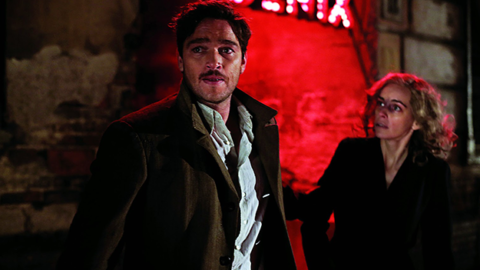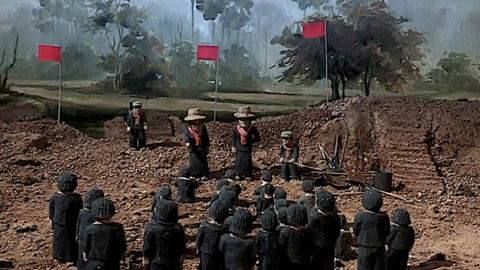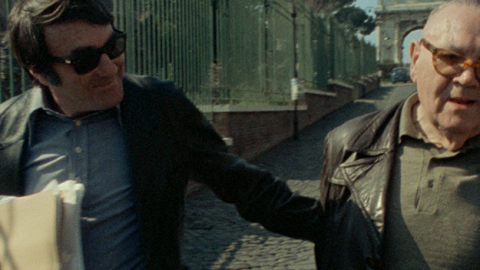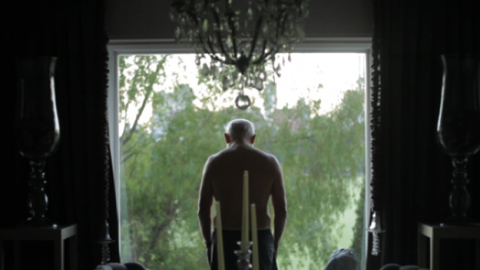Deep Focus: Denial
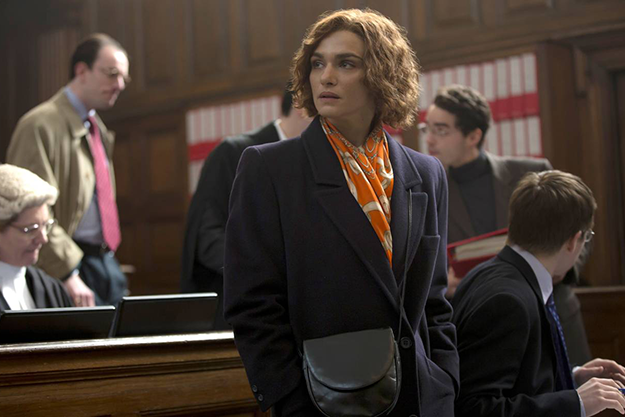
Denial moves efficiently yet too deliberately through the London libel trial of Deborah Lipstadt (Rachel Weisz), the eminent Emory University historian who was sued for defamation by British historical fantasist David Irving (Timothy Spall), after calling him “one of the most dangerous spokespersons for Holocaust denial” in her 1993 book, Denying the Holocaust. “Familiar with historical evidence,” she wrote, “he bends it until it conforms with his ideological leanings and political agenda. A man who is convinced that Britain’s great decline was accelerated by its decision to go to war with Germany, he is most facile at taking accurate information and shaping it to conform to his conclusions.”
The movie, adapted by David Hare (Plenty) from Lipstadt’s History on Trial: My Day in Court with a Holocaust Denier (2005), and directed by Mick Jackson (A Very British Coup, HBO’s Temple Grandin), is a rigorous docudrama, focusing tightly and accurately on the bench trial itself (no jury). It presents persuasive examples of Irving’s specific alterations of Holocaust history. It also exposes the ways false moral and intellectual equivalencies—the notions that all opinions are equal, and that every argument has two valid sides—can protect a slippery figure like Irving from censure and give cover to ugly goals like rehabilitating Hitler.
Emotionally and dramatically the movie is mysteriously skewed. The most fascinating material goes by lickety-split while Hare and Jackson slow down to focus on Lipstadt’s skepticism, then her growing warmth toward her solicitor Anthony Julius (Andrew Scott) and barrister Richard Rampton (Tom Wilkinson). Is that really the best “arc” the filmmakers could find? It rests on the obvious contrasts between Lipstadt as a fiercely authentic Jewish-American woman, who must learn to button her lip and keep her emotions under wraps, and the lawyers as methodical U.K. professionals, who must assure her that they only seem heartless.
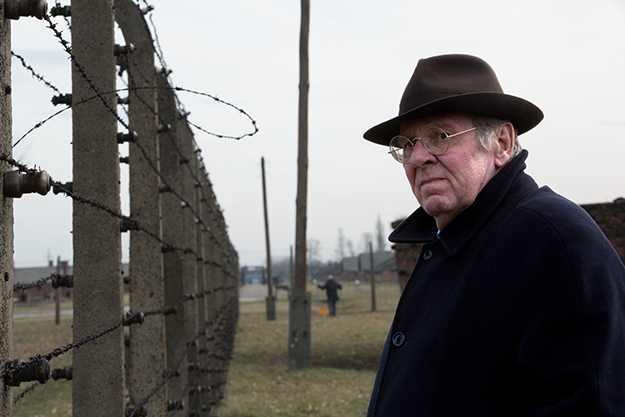
Lipstadt learns that in British law, the burden of proof is on the defendant. Julius, who wrote an acclaimed book on T.S. Eliot’s anti-Semitism and handled Princess Diana’s divorce, devises a strategy of demonstrating beyond a reasonable doubt that Irving’s work is intentionally fallacious. He enlists a corps of historians and researchers to comb through Irving’s publications and diaries for instances of bigotry and racism, calculated distortions of historical records, and bias toward Hitler and his Aryan mythology.
Rampton carries out Julius’s tactics with masterly courtroom technique. (Wilkinson does his most polished movie acting in years for this role.) Irving chooses to mount his own defense, portraying himself as David going up against legal Goliaths. Rampton finds subtle ways to express contempt for him, such as looking at Irving only from the corner of his eyes. Julius and Rampton intend to keep Lipstadt and Holocaust survivors off the stand. They feel Lipstadt’s written words are her most effective weapon, and they won’t subject survivors to questioning from an anti-Semite. (They argue that the very sight of Irving questioning them could give Irving undue credibility.) They aim to maintain a withering focus on Irving’s racism, anti-Semitism, and Holocaust denial.
The filmmakers emphasize the difficulty of respecting Holocaust survivors and the six million dead during legal and forensic proceedings. In this compressed format, they attempt to bring it home with a couple of scenes depicting Lipstadt’s connection to a survivor who watches over her from the gallery and begs that the suffering of the camps be heard in court. But the issue of Lipstadt’s emotional and spiritual integrity gets subsumed in the question of whether she can stay focused on winning her case, resisting the survivor’s heartfelt pleas as well as Irving’s brutal provocations.
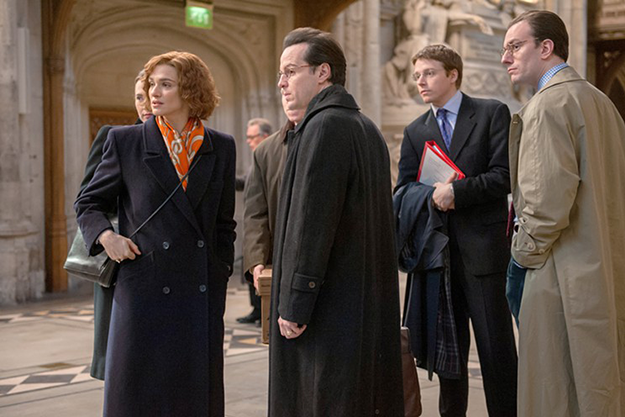
Hare’s general adherence to his own sophisticated form of condensation, remaining faithful to the letter of Lipstadt’s case while whipping it into a 110-minute format, results in a flat, predigested ambiance. Even Jackson, a nimble director, gets thrown off his stride. Most of the audience will come in with the vague memory that the lawyers proved to be right. The details are what’s fascinating. At the eleventh hour, the judge, Sir Charles Gray (Alex Jennings), asks a startling question that puts the trial’s outcome in doubt just when the proceedings seem to be going Lipstadt’s way. En route to that moment, the isolated arguments over, for example, Irving’s denial that there were holes in a gas chamber roof (so he can say it couldn’t be a gas chamber), and his altering a reference in Himmler’s phone log about halting a single transport “train” to “trains” (in order to certify that Hitler wanted to stop liquidating Jews), are too sparse to represent such a sweeping case. They don’t meet the difficult task of executing a portrait of the Nazi death machine in pointillist strokes.
Hare’s docu-dramaturgy curtails psychological exploration. Irving at first makes a compelling villain, at once outside the academic Establishment (for financial reasons, he dropped out of college), and hungry for academic approval. Spall gives him a trademark expression, a cross between a grin and a scowl, that’s intriguing but ultimately unreadable and exhausting. And Hare resorts to stock or ill-chosen expressions of Lipstadt’s aggressive character. To judge from this movie and Sully, jogging appears to be the preferred way for based-on-a-true-story movie heroes under pressure to work off their tensions. And it’s unfortunate that after linking Lipstadt to the warrior prophetess Deborah, who led the Israelites against oppressive Canaanites, Hare makes her linger, repeatedly, at a sculpture of Boudicca, the warrior queen who led Britain’s Celts against invading Romans.
Yet Weisz is wonderful in this movie. Her performance is a victory for her honest and instinctive acting temperament. She doesn’t shy from allowing Lipstadt to be clumsy or grating when questioning her high-powered legal team. More important, Weisz somehow creates an eloquent form of theater when Lipstadt sits with them in the Royal Courts of Justice. Waves of anxiety, disbelief, anger, and relief break across the expressive planes of her face. Lipstadt’s lawyer’s insistence that she remain an observer catalyzes a display of silent performance that is deeply felt and virtuosic.
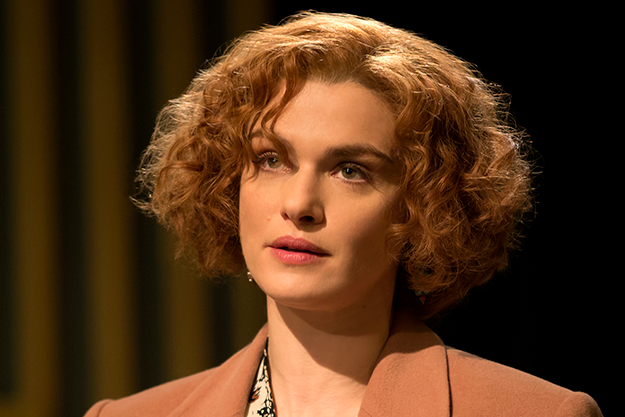
Despite its numerous faults, the movie is worth seeing for Weisz, and for its overall intelligence and pertinence. During a brief prologue depicting Lipstadt’s disciplined, comfortable life in her Atlanta home and classrooms, she explains at a book-related lecture that she refuses to debate Holocaust deniers because the fact that the Holocaust happened is not open to debate. It’s 1994, but already students are questioning whether she’s close-minded, opposed to the free exchange of ideas, and unwilling to test her views in the intellectual marketplace. Irving, in the audience, encourages this line of argument when he interrupts her, waves $1,000, and offers it to “anyone who can prove that Hitler ordered the killing of the Jews,” then gives out his own books for free. (This episode doesn’t appear in Lipstadt’s book, but the press notes refer to it as a “real-life moment,” and it certainly feels like one.)
In a couple of third-act vignettes, the film carries its debate over academic freedom to its real-life conclusions. Distinguished historians on TV and in editorials accused Lipstadt’s team of putting a chill on the practice of history. It’s as if they believed she had brought the case against Irving, and not the other way around. They were unable to recognize (to quote Lipstadt’s book) “that forcing an academic to defend her scholarly work at tremendous personal and professional costs” should be what upset historians. In The Daily Telegraph, the military historian Sir John Keegan actually wrote that the exhaustive and negative examination of Irving’s record “will send a tremor through the community of 20th-century historians.”
Denial deftly establishes how the moral relativism of contemporary academics and the journalistic belief in giving all viewpoints equal time lead to intellectual bankruptcy. In the 21st century, we’re still learning the dangers of those practices—at our peril.
Michael Sragow is a contributing editor to Film Comment and writes its Deep Focus column. He is a member of the National Society of Film Critics and the Los Angeles Film Critics Association. He also curates “The Moviegoer” at the Library of America website.



